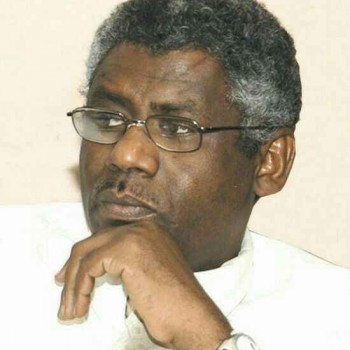
As I See It
Adil Al-Baz
Those who listened to Hamdok’s speech on the anniversary of October – an event almost forgotten amidst the chaos of this war – have realized that the president, lost in confusion, has been in a prolonged stupor with no sign of when he might emerge. In just ten days, we were burdened with two speeches from scarecrows: Hemeti and Hamdok, both of whom have lost all relevance among the Sudanese people. Every time Hamdok speaks, I can’t help but think of the bull in that warehouse, as you’ll soon understand when we go over key points from his latest speech.
From the moment I heard the speech, I thought it was incomplete. For the first time, Hamdok, or “Taqadum” (his movement), failed to mention the “floul” (the remnants of the old regime) or the Islamists. What happened? Was this omission accidental? How could Taqadum forget to denounce and insult them, given that most of their speeches are incomplete without this? Something strange is going on. Have they recovered from their obsession? Or are they sensing a shift in the wind and waiting to see where it blows? Or perhaps they’ve realized that their sponsor now seeks dialogue with the Islamists, rendering them silent.
One thing that stood out to me in Hamdok’s speech was his statement: “What is happening in Sudan today is an attempt to erase the deeply rooted identity and history of the Sudanese people, stretching back thousands of years.”
Who, other than his allies – the unruly Janjaweed militia – is trying to obliterate the identity and history of the Sudanese people by destroying everything tied to it: museums, libraries, publishing houses, and cultural institutions? What’s disheartening is that these crimes happen in plain sight of Taqadum’s intellectuals, yet they are unable to condemn them.
In another part of his speech, Hamdok said: “This war cannot be resolved through what he termed the simplistic, reductionist view that frames it merely as a war between two generals.”
With this, Taqadum redefines the nature of the conflict. It’s no longer just a conflict between two generals, implying that it isn’t a senseless war but has a purpose – to erase the identity and history of the Sudanese people. But if the war seeks to destroy your identity and history, how is your only response a feeble slogan of “No to War”? Aren’t you ashamed? If a war targets your very existence and you do not rise to defend it, what else do you intend to defend – and when?
Hamdok also said: “The Sudanese people will not abandon their project of liberation and emancipation, no matter what the forces of darkness and those behind them do.”
Has anyone seen any “liberation project” from Hamdok or Taqadum? What are these so-called “forces of darkness”? There is no force darker than the Janjaweed and their destructive agenda. The Sudanese have never faced a more ruinous project or darker force. Is Hamdok referring to his own allies? The ones we all know are backed by the same sponsor that supports him? Or perhaps he’s hinting at the Islamists, but they are not backed by any state or external force. How could anyone with common sense label the Islamists as “forces of darkness” and the Janjaweed as “forces of enlightenment” – and then align with the latter? Only the fools within Taqadum could manage such absurdity.
The most baffling part of Hamdok’s speech was his statement: “There has been no legitimate government in Sudan since the October 25, 2021 coup, and granting legitimacy to the de facto government will not help resolve this war.”
Which illegitimate government is Hamdok referring to? Isn’t it the same government that he accepted to lead as Prime Minister for two months after the coup, from October 25, 2021, to January 6, 2022? Weren’t his comrades accusing him of colluding with the military? Does he now think that legitimacy only comes through him? If the army – a key partner in the revolution without whom it wouldn’t have succeeded – is not legitimate, then where does Hamdok derive his legitimacy from? From the same revolution in which he never wrote a single tweet? Isn’t it the same revolution that led us into this ruin, causing the people to reject its leaders and blame them for the war?
It’s strange that Hamdok believes denying the government legitimacy will help end the war. How does that make sense? If the international community withdraws recognition from the government, who will step in as the legitimate authority to end the war? Hamdok and his associates? Or should the state remain leaderless until the war ends? Who will manage the war effort in the meantime? Is the goal for the government to surrender to the Janjaweed so that Hamdok can return as Prime Minister with international recognition?
I have never seen a man who ridicules himself with every word he utters and invites scorn for his nonsense the way Hamdok does. Since taking office as Prime Minister, he has never presented a coherent program for either of his two governments, both of which eventually collapsed. Nor has he provided meaningful opposition ideas, leaving his political movement as nothing more than a laughingstock defined only by its dependence on foreign powers. Today, Hamdok drifts aimlessly between conferences, offering empty words on public platforms, waiting by the political roadside for the Janjaweed to carry him back into the Prime Minister’s Office – a dream that will never come true.



